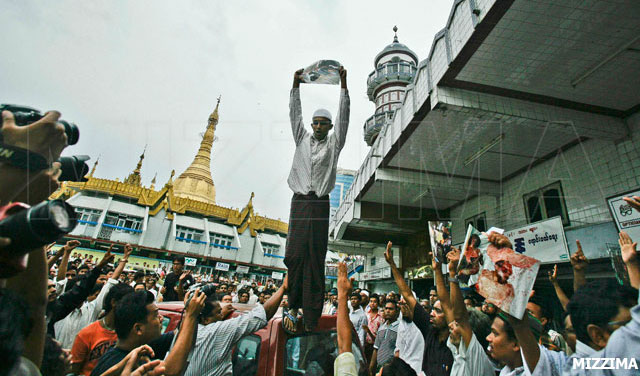A government investigative committee has been formed to determine the cause and identify the perpetrators in the murder of at least nine Muslims in Arakan State on Sunday.

A front page notice was published on Thursday in The New Light of Myanmar, the official, state-run newspaper.
The murders were the worse case of sectarian violence in recent years. A rampaging mob stopped a bus bound for Rangoon that it believed was carrying people responsible for the rape and murder of a young Rakhine woman, Ma Thida Htwe, 27, on May 28.
Three men have been arrested in connection with her death and will be brought to trial soon, say reports.
The article called her murder and the subsequent murder of Muslims “lawless and anarchic acts that can harm peace, stability and the rule of law in Rakhine State.”
“The government is now marching towards a new democratic society making political and economic reforms in the country. At the same time it is also educating the people step by step to observe the democratic practices,” said the article.
A small, peaceful protest was held near a mosque in Rangoon on Wednesday, calling for the government to act in the case.
The 16-member investigation committee includes Brig-Gen Kyaw Zan Myint, the deputy minister of Home Affiars, who will serve as chairman, and Police Brig-Gen Zaw Win, the vice chief of the Myanmar Police Force, who will serve as vice chairman.
The committee appeared to be comprised entirely of government officials with no representatives from NGOs, religious organizations or ethnic groups included
The committee is charged with determining the cause of the incident, the leaders of the mob, the actual offenders in the murders and to make recommendations concerning legal actions.
Rakhine residents in Taunggote Township said the attack was ignited by the rape and murder of the Rakhine girl.
“More than a hundred people beat and killed those people. The residents even torched the bus,” said a local resident, adding that the police arrived, but they were unable to control the rampaging crowd, according to an article by Agency France Presse.
Clashes between Buddhists and Muslims occur periodically in Burma and in Rakhine State, which borders Bangladesh and is a hotspot for religious tensions.
Buddhists make up some 89 per cent of Burma’s population, with Muslims representing about four per cent.
Rakhine state has a large Muslim minority. Among them, the Rohingya are the most well known, making up approximately 25 per cent of the state's population. The Rohingya population, according to a 2009 U.N. estimate, numbered about 723,000; they are not counted as citizens by the government and are denied common benefits.


